I have stored a graph in a 2D array and I want to print all the possible path from any directed graph going from left to right through groups. I have given an example below and want to print all the paths from the first group (in this example G1) to any last group (in this example G3). I'm not able to build a recursive or recursion method to print all the paths with any amount of groups. So I need help with building a manual iteration system/algorithm. Thanks.
graph:
script.py
map = [
[1,2],
[3,4,5],
[6,7]
]
// Print all paths
// Note :- every array in the map is a group
output:
1 -> 3 -> 6
1 -> 3 -> 7
1 -> 4 -> 6
1 -> 4 -> 7
1 -> 5 -> 6
1 -> 5 -> 7
2 -> 3 -> 6
2 -> 3 -> 7
2 -> 4 -> 6
2 -> 4 -> 7
2 -> 5 -> 6
2 -> 5 -> 7
